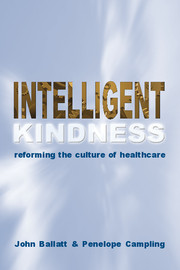12 - Intelligent kindness
from Part III - The organisation of kindness
Published online by Cambridge University Press: 01 January 2018
Summary
The notion that ethics, altruism and fellow-feeling are scarce resources, whose supply is fixed once and for all and depleted with use, this idea seems to me outlandish – outlandish but deeply influential. My aim in these lectures has been to call this idea into question. I've tried to suggest that the virtues of democratic life – community, solidarity, trust, civic friendship – these virtues are not like commodities that are depleted with use. They are rather like muscles that develop and grow stronger with exercise.
(Michael Sandel, 2009)A change of mind
To apply the lessons from this exploration of the place of kinship and kindness in healthcare will require a radical change of direction. This change will need courage and imagination. It will need framing within a thorough application of intelligent kindness, an attitude and a philosophy that:
• unsentimentally values kinship and kindness, understanding their creative, motivating power
• recognises their effectiveness in driving quality, effectiveness and efficiency, as outlined in the ‘virtuous circle’ explored in Chapter 3
• understands what inhibits or liberates kindness at an individual, team, organisational or inter-agency level
• learns from and applies the body of knowledge on how to address these dynamics, valuing such work alongside other necessary approaches to delivering healthcare
• understands and mitigates the inevitable inhibiting effects of such processes as industrialisation, performance management, regulation and competition
• holds fast to the principle of enabling and protecting the ‘freedom to serve the public’ necessary for attentive, responsive and effective kindness, making, protecting and enabling this freedom the priority.
Without underestimating the difficulty involved, this reorientation is of such importance for the improvement and well-being of the NHS that it has to be made. Though the frankly horrifying excesses revealed in Mid-Staffordshire are extreme, the dynamics that produced them are everywhere in the NHS, and there is the risk that they could tip into such outcomes at any time, anywhere. These dynamics are at work in society at large, in government, the civil service and inside NHS organisations. Some of them are inevitable, and require recognition and management as the potentially dangerous forces they are. In the case of others, there is a choice.
- Type
- Chapter
- Information
- Intelligent KindnessReforming the Culture of Healthcare, pp. 175 - 189Publisher: Royal College of PsychiatristsPrint publication year: 2011



